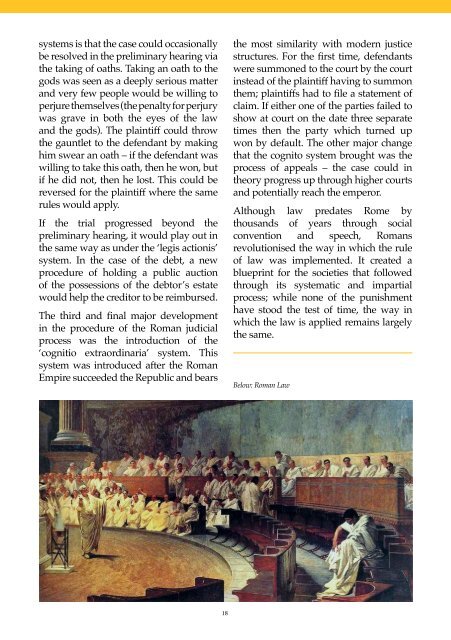Create successful ePaper yourself
Turn your PDF publications into a flip-book with our unique Google optimized e-Paper software.
systems is that the case could occasionally<br />
be resolved in the preliminary hearing via<br />
the taking of oaths. Taking an oath to the<br />
gods was seen as a deeply serious matter<br />
and very few people would be willing to<br />
perjure themselves (the penalty for perjury<br />
was grave in both the eyes of the law<br />
and the gods). The plaintiff could throw<br />
the gauntlet to the defendant by making<br />
him swear an oath – if the defendant was<br />
willing to take this oath, then he won, but<br />
if he did not, then he lost. This could be<br />
reversed for the plaintiff where the same<br />
rules would apply.<br />
If the trial progressed beyond the<br />
preliminary hearing, it would play out in<br />
the same way as under the ‘legis actionis’<br />
system. In the case of the debt, a new<br />
procedure of holding a public auction<br />
of the possessions of the debtor’s estate<br />
would help the creditor to be reimbursed.<br />
The third and final major development<br />
in the procedure of the Roman judicial<br />
process was the introduction of the<br />
‘cognitio extraordinaria’ system. This<br />
system was introduced after the Roman<br />
Empire succeeded the Republic and bears<br />
the most similarity with modern justice<br />
structures. For the first time, defendants<br />
were summoned to the court by the court<br />
instead of the plaintiff having to summon<br />
them; plaintiffs had to file a statement of<br />
claim. If either one of the parties failed to<br />
show at court on the date three separate<br />
times then the party which turned up<br />
won by default. The other major change<br />
that the cognito system brought was the<br />
process of appeals – the case could in<br />
theory progress up through higher courts<br />
and potentially reach the emperor.<br />
Although law predates Rome by<br />
thousands of years through social<br />
convention and speech, Romans<br />
revolutionised the way in which the rule<br />
of law was implemented. It created a<br />
blueprint for the societies that followed<br />
through its systematic and impartial<br />
process; while none of the punishment<br />
have stood the test of time, the way in<br />
which the law is applied remains largely<br />
the same.<br />
Below: Roman Law<br />
Xenophanes<br />
Jonathan, Lower Sixth<br />
In the Autumn term Dr Shaul Tor, Senior<br />
Lecturer in Ancient Philosophy at King’s<br />
College London, delivered an insightful<br />
lecture on the philosophy of Xenophanes<br />
to the Hylocomian Society. His theme<br />
was: What if cows could draw Gods?<br />
And what do we see in a rainbow? Some<br />
philosophical questions in Xenophanes.<br />
Dr Tor began with an exploration of<br />
Xenophanes’ biography. The Presocratic<br />
philosopher was active in Colophon<br />
(in Ionia) at the end of the sixth and<br />
beginning of the fifth century BCE. He<br />
travelled widely around Greece and<br />
wrote in verse, using both the hexameter<br />
and elegiac form. Xenophanes’ interests<br />
lay in theology, knowledge and belief,<br />
natural philosophy, ethics and politics.<br />
His work remains either in fragmentary<br />
form or preserved in the works of other<br />
writers such as Aristotle and Plutarch.<br />
Dr Tor then proceeded to reveal how<br />
the fragmentary evidence we have for<br />
Xenophanes’ work can be worked into a<br />
coherent picture of his stated perspective<br />
on the nature of the gods. By way of<br />
context it is important to consider the<br />
fact that the ancient Greek literary canon<br />
drew heavily on Homer’s epics, The<br />
Iliad and The Odyssey, and Hesiod’s<br />
poetry about the origins of the gods,<br />
Theogony. Both writers feature multiple,<br />
anthropomorphic, imperfect deities.<br />
However, fragments of Xenophanes’<br />
work show him noting mortal belief that<br />
gods are born and have bodily form and<br />
clothing similar to their own.<br />
He further notes that the poets portray<br />
the gods as committing acts which are<br />
reprehensible for mortals, for example<br />
theft, adultery and deceit. Aristotle’s<br />
18 19<br />
capture of Xenophanes’ philosophy<br />
suggests that he considered it to be<br />
impious to suggest that gods came into<br />
being or die. Furthermore, Xenophanes’<br />
fragments draw out his suggestion that<br />
all people create god in their own image;<br />
he suggests that the Thracians and<br />
Ethiopians, who tend to look physically<br />
very different, say that their gods look<br />
like them and, if they could draw, horses<br />
would render images of their gods to look<br />
like horse and oxen to look like oxen.<br />
What is particularly interesting in the<br />
further fragments is the similarity<br />
of Xenophanes’ philosophy to a<br />
monotheistic system. Although his<br />
assertion of “One god, greatest among<br />
gods and men,” does not exclude<br />
polytheism, his assertion of this being<br />
as “not at all like mortals either in frame<br />
or cognition” implies an unknowable<br />
quality in a supreme god. Moreover,<br />
he also alludes to an omniscience and<br />
omnipotence in this supreme god. This<br />
being is further located as unchangeable<br />
in space and time. These fragments have<br />
remarkable resonance in modern religion.<br />
Xenophanes is no less critical of the minor<br />
deities, often deployed by ancient writers<br />
to explain natural phenomena. In a further<br />
fragment, he critiques the goddess Iris,<br />
who manifests as a rainbow, believing her<br />
to be “by nature cloud, purple, and red,<br />
and greenish-yellow to behold.” This is<br />
a marked step away from the Olympian<br />
pantheon and their attendant demi-gods<br />
and goddesses, who cause thunder,<br />
storms, and the changing of the seasons.<br />
In short, Dr Tor left us with the impression<br />
of a very modern mind forged in an<br />
ancient context and much to consider<br />
to explore further the philosophy of the<br />
Presocratics.


















